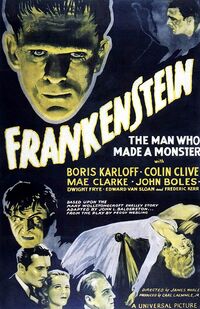Frankenstein (1931 Film): Difference between revisions
(Created page with "==Relevance== {{Page |DiscogsArtistId= |WikipediaPageTitle=Frankenstein_(1931_film) }} Category:Influences on Morrissey - Film and Television") |
No edit summary |
||
| (7 intermediate revisions by 2 users not shown) | |||
| Line 1: | Line 1: | ||
[[File:Frankenstein.jpg | 200px | right | thumb |Frankenstein film poster]] | |||
==Relevance== | ==Relevance== | ||
A clip from this film has featured in the pre-show videos.<br> | |||
See also:<br> | |||
[[Boris Karloff]] | |||
[[Category:Influences on Morrissey - Film and Television]] | |||
{{Page | {{Page | ||
| | |RelatedForumThreads=150125 | ||
|WikipediaPageTitle=Frankenstein_(1931_film) | |WikipediaPageTitle=Frankenstein_(1931_film) | ||
}} | }} | ||
{{PageDate}} | |||
Latest revision as of 19:52, 11 February 2023
Relevance
A clip from this film has featured in the pre-show videos.
See also:
Boris Karloff
Mentioned In
Wikipedia Information
 |
Frankenstein is a 1931 American gothic pre-Code science fiction horror film directed by James Whale, produced by Carl Laemmle Jr., and adapted from a 1927 play by Peggy Webling, which in turn was based on Mary Shelley's 1818 novel Frankenstein; or, The Modern Prometheus. The Webling play was adapted by John L. Balderston and the screenplay written by Francis Edward Faragoh and Garrett Fort, with uncredited contributions from Robert Florey and John Russell. Frankenstein stars Colin Clive as Henry Frankenstein (Victor Frankenstein in the novel), an obsessed scientist who digs up corpses with his assistant in order to assemble a living being from body parts. The resulting creature, often known as Frankenstein's monster, is portrayed by Boris Karloff. The makeup for the monster was provided by Jack Pierce. Alongside Clive and Karloff, the film's cast also includes Mae Clarke, John Boles, Dwight Frye, and Edward Van Sloan. Produced and distributed by Universal Pictures, the film was a commercial success upon release, and was generally well received by both critics and audiences. It spawned a number of sequels and spin-offs, and has had a significant impact on popular culture: the imagery of a maniacal "mad" scientist with a hunchbacked assistant and the film's depiction of Frankenstein's monster have since become iconic. In 1991, the United States Library of Congress selected Frankenstein for preservation in the National Film Registry as being "culturally, historically, or aesthetically significant".
Related Forum Threads
- Mporium (UK) Ltd edition "Our Frank" shirt added until November 6 (October 17, 2022) - Morrissey-solo (Oct 17, 2022)
